What we cover in this article
Discover the best dashboard software for small businesses, streamlining your metrics with real-time, user-friendly tools. From Minimal Dashboard's simplicity to Tableau's powerful analytics, find the perfect fit to consolidate sales, customer insights, and marketing performance. Elevate your business with actionable insights and efficient data management.
Contents
- Introduction
- Why Listen to Us?
- What is Dashboard Software?
- Top 6 Dashboard Tools for Small Businesses
- Streamline Your Small Business Workflow with Minimal Dashboard
Introduction
Imagine having all your critical metrics—sales, customer behavior, and marketing performance—consolidated into one easy-to-read, real-time dashboard.
Instead of bouncing between endless spreadsheets or manually updating reports, wouldn’t it be more efficient to see everything in one place, tailored to your needs?
In this Minimal Dashboard article, we’ll share our review of the top dashboard solutions for small businesses available today.
But first…
Why Listen to Us?
At Minimal Dashboard, we simplify the process of monitoring business metrics by offering a real-time, customizable dashboard that consolidates all your key data in one place. With our expertise, you can focus on making informed, data-driven decisions for your organization.
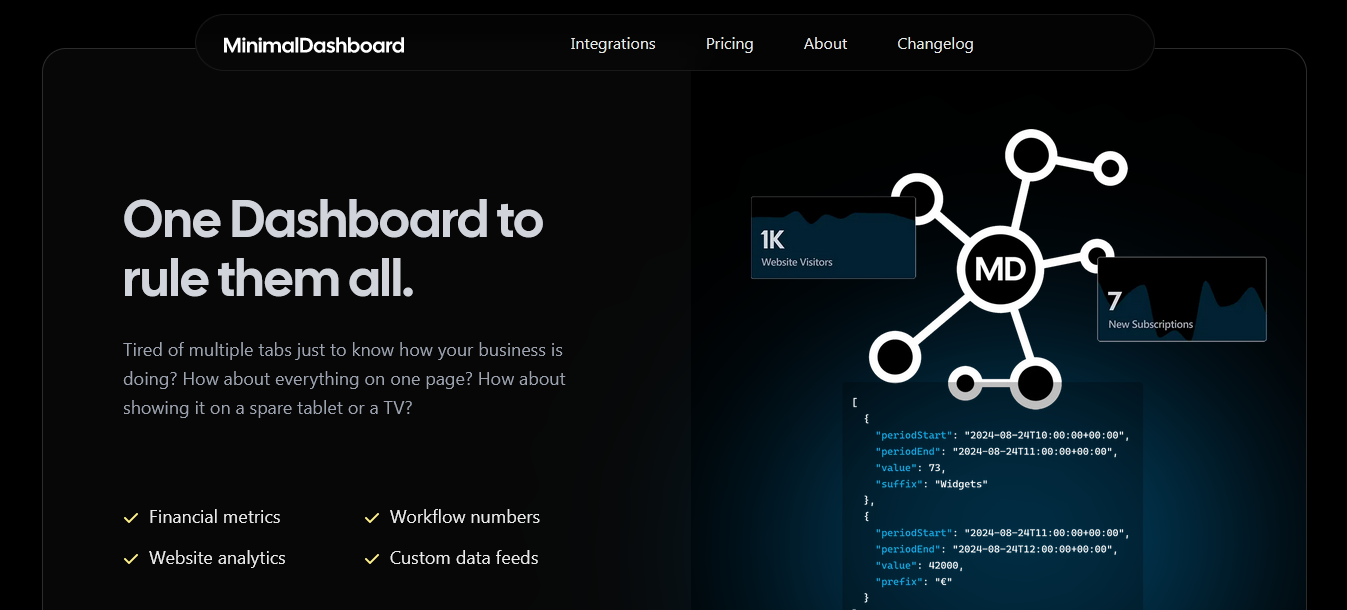
What is Dashboard Software?
Dashboard software is a powerful tool that helps businesses consolidate and visualize key data in one easy-to-read platform. Instead of manually tracking sales, customer insights, marketing performance, or inventory across multiple spreadsheets or apps, the right dashboard tool integrates all this information into a single, interactive display.
For small business owners, this means no more manually generating reports or gathering data from various sources, freeing up time for more strategic tasks.
A well-designed business dashboard provides clear, actionable insights that help manage operations more effectively, identify growth opportunities, and stay agile in a competitive market.
Top 6 Dashboard Tools for Small Businesses
- Minimal Dashboard
- Tableau
- Zoho Analytics
- Looker Studio
- Klips by Klipfolio
- Databox
1. Minimal Dashboard
Minimal Dashboard stands out as one of the top dashboard software choices for small businesses due to its blend of simplicity and effectiveness. The user-friendly design and core functionalities make it a breeze for small business owners to create and control their dashboards without steep learning curves.
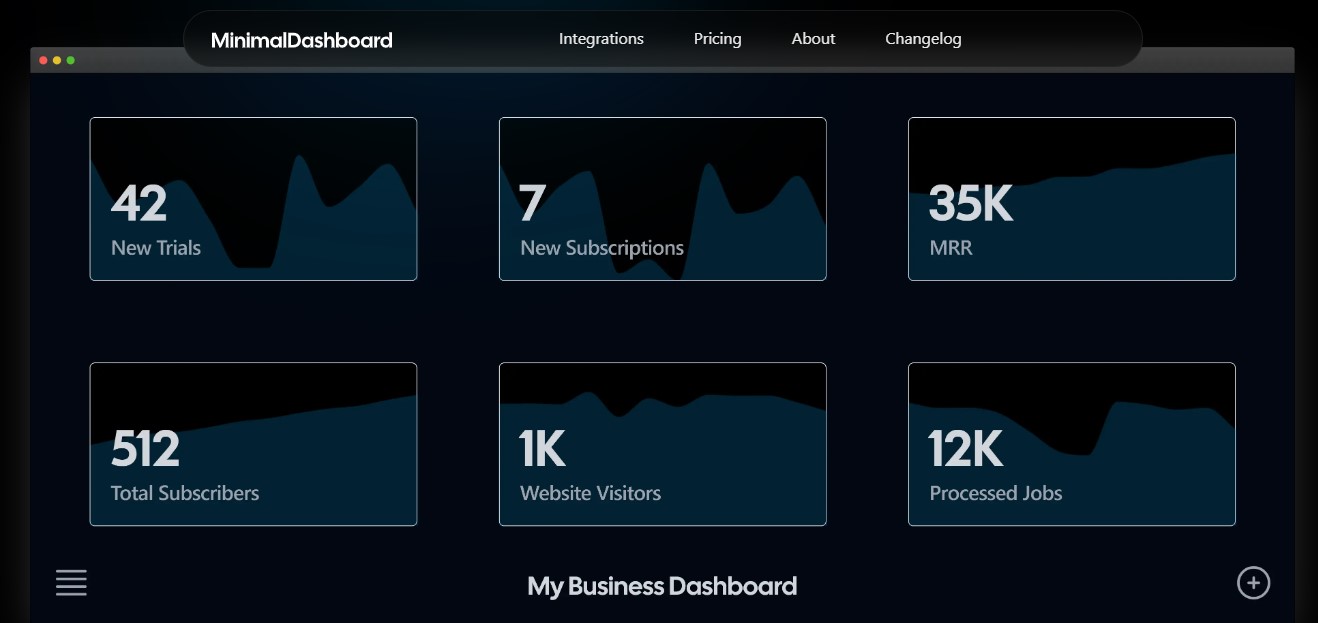
Minimal Dashboard delivers valuable insights quickly and affordably by focusing on essential features like real-time data tracking and straightforward integrations.
Key Features
- Simple, intuitive design allows for easy setup and management without technical expertise.
- Integration with popular tools and data sources, such as Stripe, Fathom Analytics, Helpscout, and Klaviyo, ensures seamless data flow.
- Responsive customer support through multiple channels, including live chat, email, and a knowledge base with guides and FAQs.
- Drill-down capabilities allow you to examine specific metrics more thoroughly, uncovering trends and insights that may not be immediately visible at the surface level.
Pricing
- Free Trial: Available for all plans, allowing users to find the best fit for their needs.
- Solo Plan: $9/month for individuals (1 dashboard, 10 metrics, 1 user).
- Startup Plan: $29/month for teams (5 dashboards, 30 metrics, 5 users).
- Business Plan: $79/month for data-driven companies (20 dashboards, 100 metrics, 50 users).
Pros
- Easy to navigate with a minimal learning curve
- Business goals monitoring capabilities with progress visualizations and automated alerts
- Budget-friendly plans tailored to small businesses
Cons
- Limited to predefined integrations, with new connections being rolled out over time
2. Tableau
Tableau is widely used for its powerful data analytics capabilities and stunning visual representations. While it’s known for serving large enterprises, Tableau’s flexibility also makes it an excellent fit for small businesses and non-technical users.
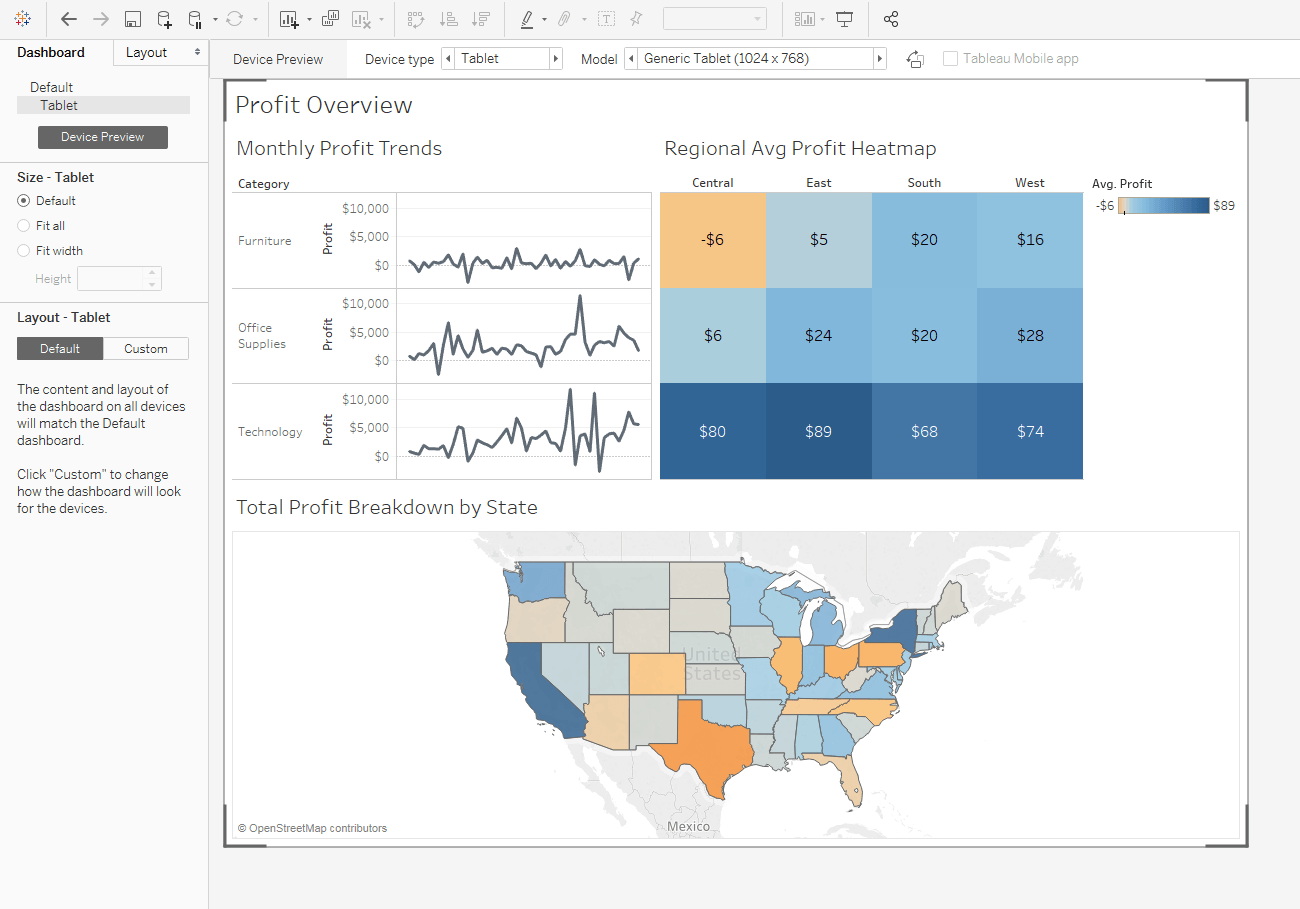
Tableau’s scalability ensures it grows alongside your business, while its affordability and mobile-friendly design make it perfect for on-the-go decision-making.
Key Features
- Intuitive drag-and-drop interface to build interactive dashboards without coding.
- Integration with various data sources, from spreadsheets and cloud services like Google Analytics and Salesforce to SQL databases.
- Customizable reports and visualizations that allow users to focus on their most critical metrics.
- Tableau is scalable and can grow with your business needs, accommodating larger datasets and more complex analytics.
Pricing
- Free Trial: Available
- Tableau Viewer: $15/user/month for dashboard creation and interaction.
- Tableau Explorer: $42/user/month for data exploration, visualization, and full-service analytics.
- Tableau Creator: $75/user/month for full feature access, including data preparation, management, and insights.
Pros
- Robust and secure architecture with Tableau Prep Tool to clean up messy databases
- Strong community support and extensive resources, guides, etc.
- Powerful calculations and data blending capabilities furnish meaningful insights
- Mobile compatibility allows users to interact with dashboards on multiple devices
Cons
- No automatic option to refresh your reports
- Limited collaboration options beyond Tableau Server
3. Zoho Analytics
Zoho Analytics is a comprehensive business intelligence and analytics platform that offers small businesses easy-to-use dashboard functionalities. It’s part of the Zoho suite, which includes CRM, email marketing, and project management tools, making it perfect for businesses already using Zoho products.
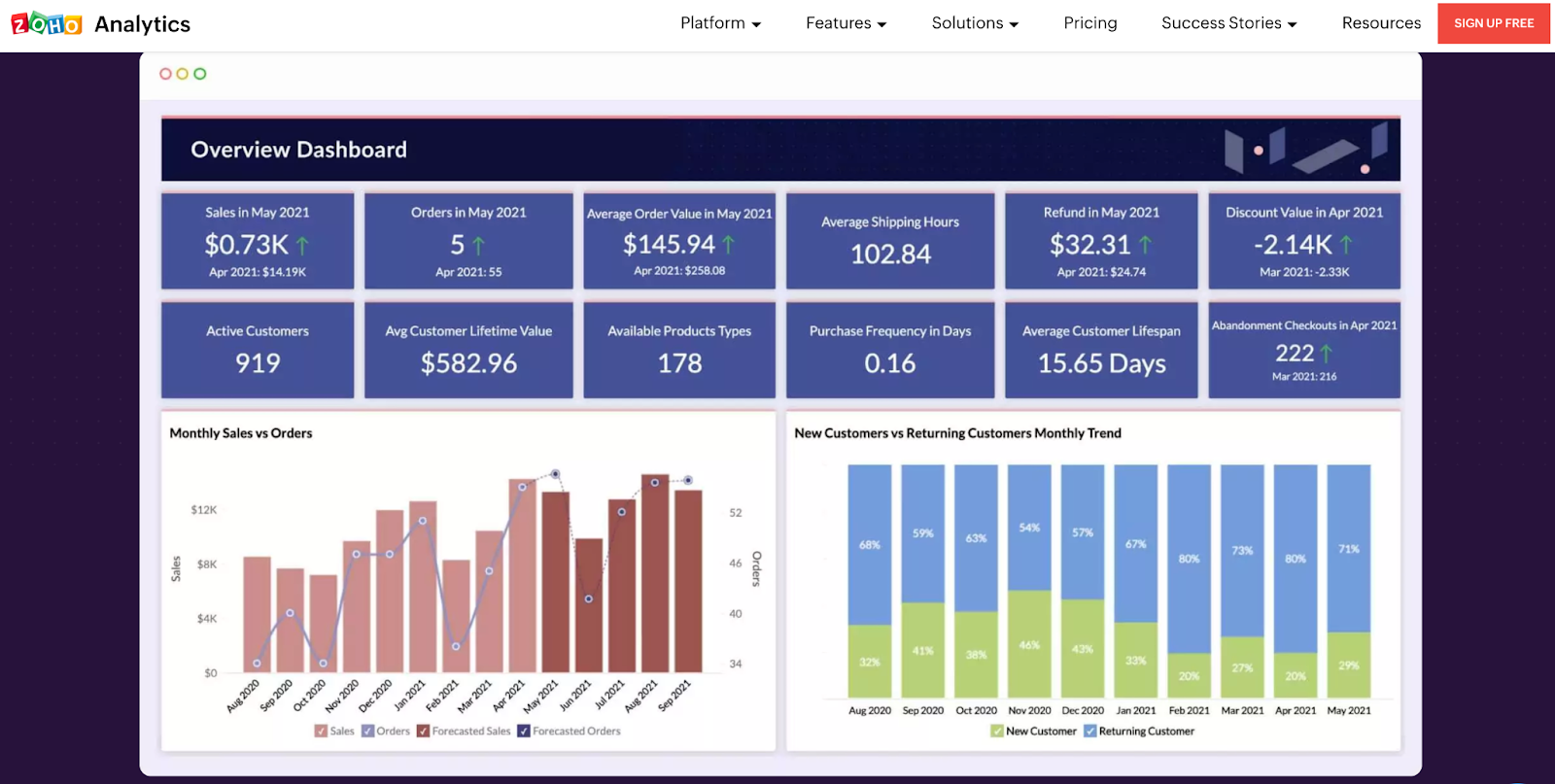
Key Features
- Integration with over 500 data sources, including cloud databases and apps like Salesforce, Google Analytics, and QuickBooks.
- Built-in AI-powered data analysis using Zia, Zoho’s AI assistant, to offer insights and predictions.
- Strong security features, including role-based access controls, data encryption, and the ability to set permissions for users.
- Sharing and collaboration features allow team members to work together, leave comments, and receive notifications for updates on dashboards and reports.
Pricing
- Free plan: Available
- Paid Plans: Starts at $22/month for 2 users (billed annually)
Pros
- Competitive pricing, with plans designed for small businesses
- AI-powered insights offer advanced functionality without the need for a dedicated data scientist
- Embedding of dashboards into other platforms, useful for customer-facing reports
- Excellent tools for data discovery & visualization like heatmaps & scatter posts
Cons
- Data cleaning and transformation capabilities are not as advanced
- Slow performance when handling large or complex data sets
4. Looker Studio
Looker Studio, formerly Google Data Studio, is a free and highly flexible dashboard tool that integrates seamlessly with Google’s suite of tools, including Google Analytics, Google Ads, and Google Sheets. It’s a suitable option for small businesses seeking cost-effective, customizable reporting.
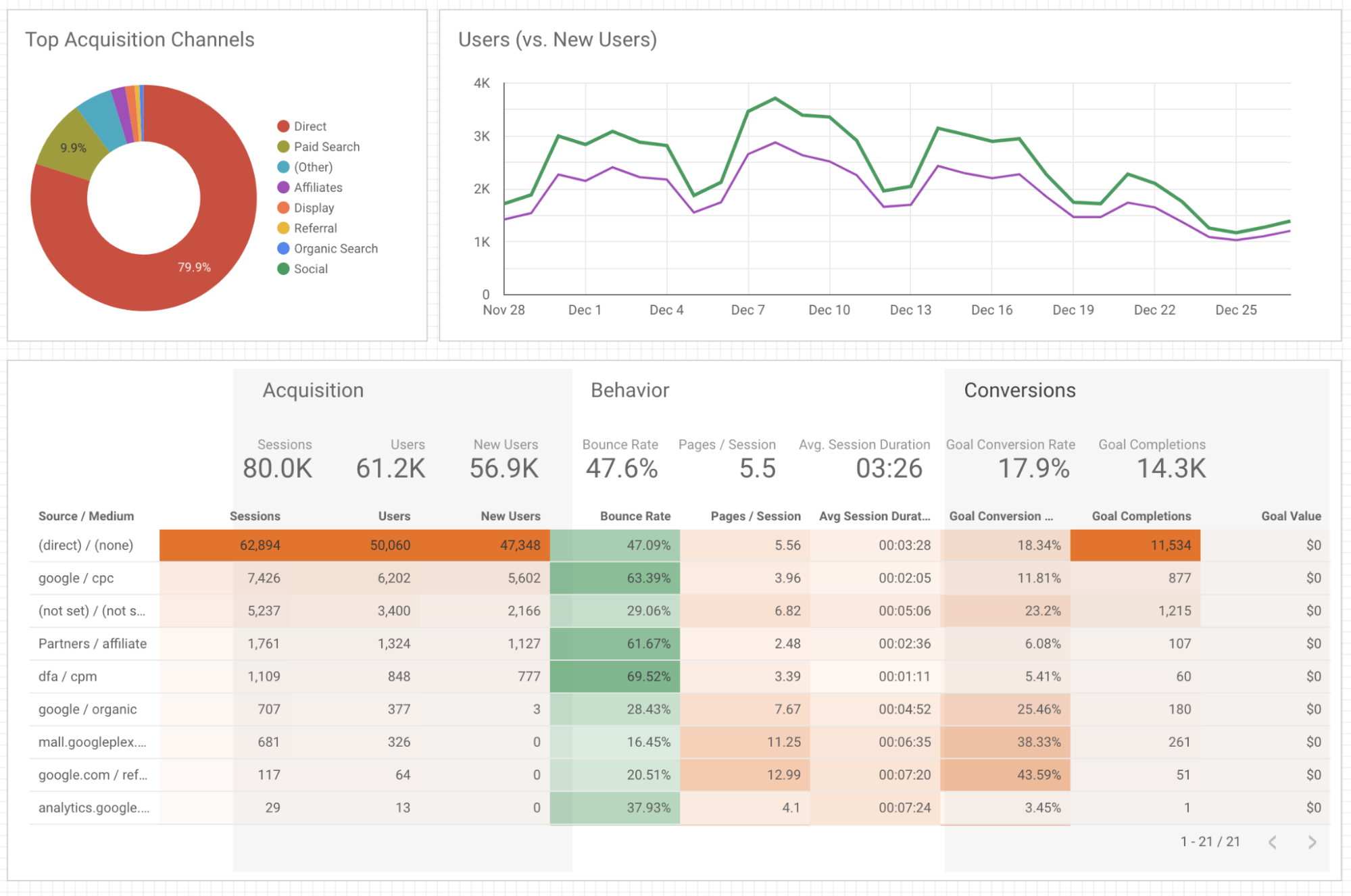
Key Features
- Integration with various Google services as well as third-party platforms via connectors.
- Customizable templates and drag-and-drop widgets for creating interactive reports and dashboards.
- Geographic mapping enables users to visualize location-based data in Google Maps, such as sales or traffic sources.
- Real-time data updates permit users to make timely decisions based on the latest information.
Pricing
- Free Plan: available
- Paid Plan: $9 per user, per project, per month
Pros
- Forever Free plan makes it an attractive choice for small businesses and startups
- As part of the Google family, it integrates smoothly with other Google services
- Numerous pre-built templates for users to speed up the report creation process
- Collaborative features like simultaneous editing, easy sharing, and permission-based access control.
Cons
- No direct support for business intelligence data formats like Excel
- Absence of advanced analytics and BI functionalities
5. Klips by Klipfolio
Klips is an excellent dashboard software for small businesses that need real-time data visualization. Known for its sleek design and comprehensive data integrations, Klips allows businesses to track metrics across various channels in real time.
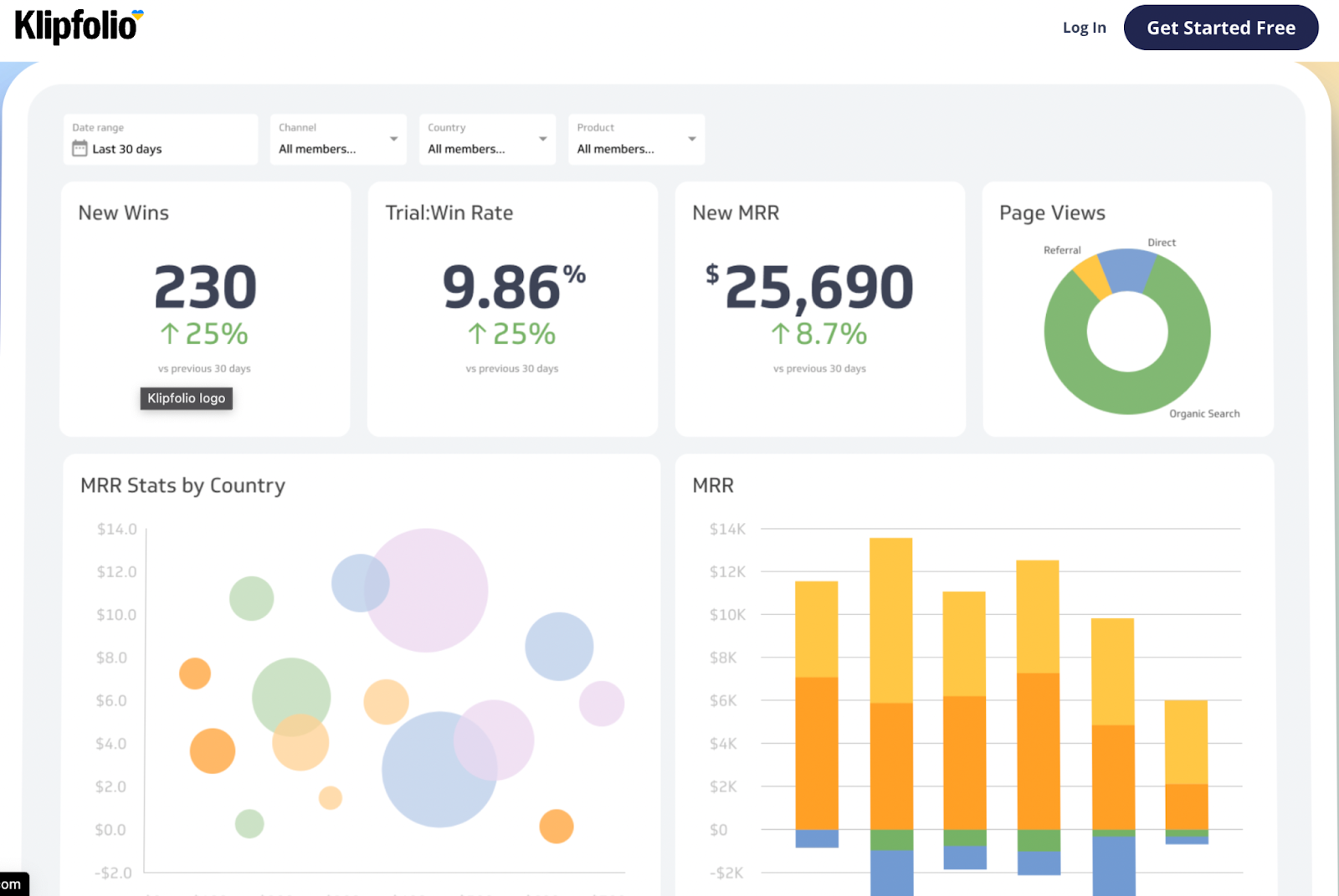
Key Features
- Integration with over 130 data sources, including social media, marketing tools, and financial platforms.
- Pre-built templates to quickly set up dashboards tailored to different business functions (marketing, finance, etc.).
- Custom branding allows you to white-label dashboards, which means you can remove the Klips logo and replace it with your company’s branding, colors, and design elements.
- Provision to perform data transformations, create custom calculations, and set up data models within Klips.
Pricing
- Free Trial: Available for 14 days
- Grow: $170/month (billed annually) offers 15 dashboards and 1hr data refresh for unlimited users.
- Team: $310/month (billed annually) offers 30 dashboards, 15-minute data refresh, and advanced customization
Pros
- A range of pricing plans cater to various business sizes and budgets
- An intuitive drag-and-drop enables users to create visually appealing dashboards
- Extensive customization options, with various visualizations and flexible layout options
- Impressive documentation for the Klip components and data transformation
Cons
- Slow loading time or performance issues when dealing with complex data sets
- Exporting to PDF or Excel does not fully preserve interactivity or visual fidelity
6. Databox
Databox is an intuitive, mobile-first dashboard software that allows businesses to track KPIs across multiple platforms. It’s designed for ease of use, making it perfect for small business owners who want insights without complicated setups. Databox has earned the trust of more than 20,000+ businesses.
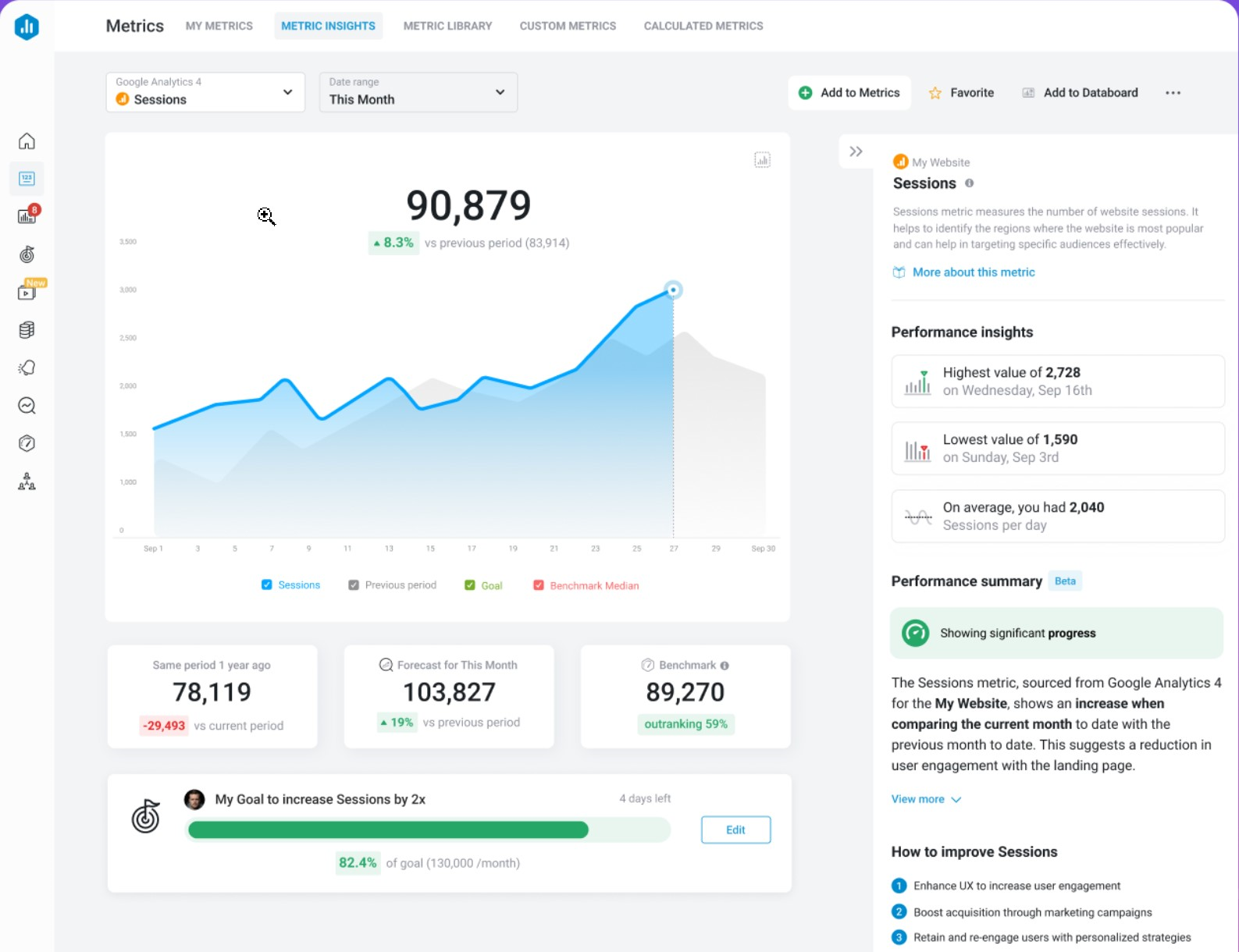
Key Features
- More than 70 one-click integrations with tools like HubSpot, Google Analytics, and Shopify.
- Real-time monitoring of key metrics and KPIs by connecting to various data sources.
- Role-based user management gives administrators control over who can view or edit dashboards.
- Scorecard features provide daily or weekly updates on key metrics directly to users’ inboxes or mobile devices.
Pricing
- Free Plan: Available, up to three data sources.
- Paid Plans: Starting at $47/month for advanced features
Pros
- User-friendly interface that makes it easy for non-technical users
- Mobile-friendly design is ideal for business owners on the go
- Excellent, prompt customer support
- Custom branding elements for sharing dashboards and reports externally or with clients
Cons
- The API documentation and support are not comprehensive
- Bugs and throughput issues when editing custom metrics
Streamline Your Small Business Workflow with Minimal Dashboard
Tracking and analyzing business metrics is key to growth, especially for small businesses. Minimal Dashboard offers a cost-effective, user-friendly solution that simplifies data visualization without unnecessary complexity.
With core features like real-time tracking and reliable support, it’s designed to help you focus on what matters.
Start your free trial today and see how Minimal Dashboard can elevate your business.
